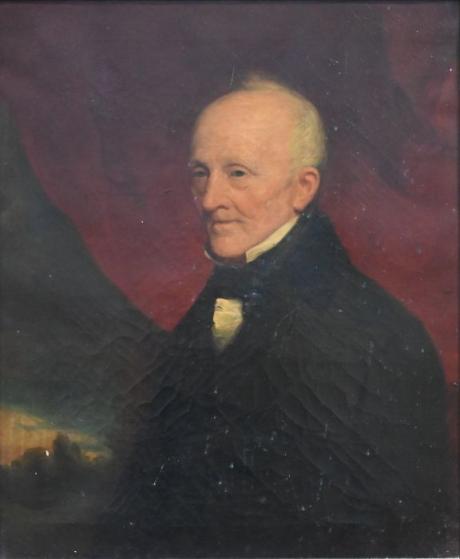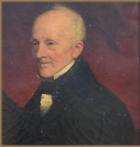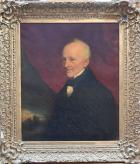Carlyon, Clement (1777–1864), physician, was born at Truro on 14 April 1777, the fourth son of the Revd John Carlyon (1722–1798), rector of Bradwell in Essex. He was educated at Truro grammar school, where Humphry Davy and Henry Martyn were among his schoolfellows. He took his degree at Pembroke College, Cambridge, in 1798 and was appointed a travelling bachelor on the Worts foundation which allowed him to travel to Germany. There he met Samuel Taylor Coleridge and joined him on a walking tour in the Harz. After completing his medical studies at Edinburgh and London, Carlyon returned to his home town in 1806 and lived there for the rest of his life. He was mayor of Truro five times and a practising physician until 1861. His autobiography, Early Years and Late Reflections, was published in four volumes between 1836 and 1858. The interesting and lively reminiscences of the first two volumes are replaced in the third and fourth by reams of dreary theology. The work's most valuable aspect was Carlyon's perceptive account of Coleridge, whose high intelligence and performativeness Carlyon understood very well. It is a pity that he never wrote a full-scale biography of him. Carlyon published Observations on the Endemic Typhus Fever of Cornwall in 1827. These were highly regarded and brought about beneficial changes to sanitation. In later life Carlyon published Precepts for the Preservation of Health (1859) and several tracts, intervening in contemporary debates about the governance of the Church of England and the role of the Book of Common Prayer. Carlyon died in Truro on 5 March 1864.
Clement Carlyon 1777 - 1864, MD Cambridge, Fellow of Pembroke College, Physician to the Cornwall Infirmary, was a British orthodox physician who converted to homeopathy after his retirement from allopathic practice, lamenting that his understanding of homeopathy ’caused (me) regret for my past shortcomings, through ignorance of the writings of Samuel Hahnemann…‘,Carlyon was a friend of Samuel Taylor Coleridge and Walter Scott, Carlyon was a ’valued contributor’ to The Homeopathic Review, as he examined homeopathy and completed his conversion to it. He laughed at ’professional men of high standing’ who ‘use their authority’ to cry down a subject they know nothing about. Carlyon points out the thousands of cure’s attributed to homeopathy, ‘well authenticated’ hospital statistics both at home and abroad, and asks ’are not facts as stubborn monitors here as in other cases?’ Calyon continued:‘…I should not be acting honestly if I were to suppress my real opinion regarding homeopathy. Perhaps I might have blundered on with Benjamin Brodie and others if I had not accidentally become acquainted with sensible and experienced homeopaths. ‘I could not be mistaken as to the good they did; and I was thereby led to reading your monthly Review where there was much to interest me, and to cause regret for my past shortcomings, through ignorance of the writings of Samuel Hahnemann…’
Carlyon wrote in his Precepts for the preservation of health, life and happiness, that ‘… there are some diseases for which the rememdy is only to be found in homeopathy…’ and ‘… homeopathy is entitled to a fair field instead of backbiting and clamour…’ … I cannot sufficiently express my abhorence of prejudices which interfere with the investigation of facts… Carlyon’s Obituary is in The British Homeopathic Review, Volume 8 in 1864, and in The West Briton and Cornwall Advertiser on March 11, 1864 and reprinted in The Medical Times and Gazette on April 23, 1864:
Truro has lost the most beloved, the most venerated, of her eons. No one at all familiar with the place and its history could doubt that these terms can apply only to Dr. Carlyon. We have long regarded with something of the tenderness that attaches to the memory of the dead this now departed representative of a generation of whom scarce another is left; and we owe it to ourselves as well as to him whose departure from among us we lament, to devote a few lines to the history of one so conspicuous for public and private virtues, and so dear to our whole community.
Dr. Clement Carlyon, a scion of an ancient Cornish stock, was the youngest son of the Rev. John Carlyon, of Truro, and of Miss Mary Winstanley, of Braunston Hall, Leicestershire, and was born on the 22nd of April, 1777. His father had been a Fellow of Pembroke Hall, Cambridge, and had gained high honours there. He was offered valuable preferment in a distant county, which he declined, although non-residence was allowed, because he did not consider himself strong enough for the full performance of its duties; and he passed a happy and useful life in Truro, whilst bringing up most excellently a large family of sons and daughters. Clement Carlyon, like his brothers, was educated at the Truro Grammar School, then most successfully conducted by the Rev. Dr. Cardew, where he had for companions, among many others afterwards distinguished, the illustrious philosopher and chemist, Humphrey Davy; Henry Martyn, the missionary; and Prebendary Kempthorne, the well known Chaplain of the Bishop of Gloucester. Each of the two last attained the pre-eminent position of Senior Wrangler, at Cambridge, and all these maintained in after life their friendly intercourse with their schoolfellow, Carlyon. He proceeded, like these great men, at once from Truro School to College, and he went out as Tenth Wrangler in 1798.
In the same year he was chosen a travelling bachelor, an appointment to which the annual stipend of £100 was then attached, with the condition that three years should be devoted to foreign travel, and that an account of what had been noticed should be periodically given in Latin letters to the University. During these journeyings, which embraced the whole of Central Europe, and extended to the northern parts of Sweden, he had for his principal companion the late Dr. Parry, son of the famous physician of Bath, and brother of William Edward Parry, the Arctic navigator; and their excursions were frequently shared b? the poet and philosopher, Samuel Taylor Coleridge. Of him, and of other remarkable men with whom he was more or less associated abroad at that critical period of the world’s history, the close of the last century and the beginning of the present, he has recorded many interesting personal traits in the volumes of his Early Years and Late Reflections, a work of his elder leisure, which includes his reminiscences of Walter Scott, Mr. Abernethy, and other celebrities of that day, with whom he was brought in contact during his medical studies in Edinburgh and London.
Dr. Carlyon was elected to one of the valuable Fellowships of Pembroke Hall, soon after he took his BA degree, and he held it till his marriage, in 1806, to his cousin, Eliza, a daughter of Mr. Carlyon, of Tregrehan. Before this conclusion of bachelor life, he had proceeded from the degree of MA, to that of MD, and settled as a Physician at Truro, where he speedily acquired the confidence of a large circle of society, including many of the principal families of Cornwall—a confidence which was rendered permanent by the remarkable combination exhibited in his character of the highest qualities of the friend and the gentleman with those of the Medical adviser. He was in truth a model Physician of the old school, a shrewd and quick observer of symptoms, full of ready resource for their treatment—clear and prompt in judgment—delicate in tact—and, above all, large and warm in heart—so that all his powers moved in active concert for the service of his patient. In 1827 he published a pamphlet on the Endemic Typhus Fever of Cornwall, in which the principles of sanitary science, of late familiarised to the public mind through so many channels, but then quite novel, are enforced with the greatest clearness of detail and weight of argument.
Before this time Dr. Carlyon had become one of the Physicians to the Cornwall Infirmary, a field of usefulness to the poor in which he delighted; and his services there were but justly estimated by the governors when on his retirement in 1849 they presented him with a very valuable and suitably inscribed salver, in connection with this Hospital, and by every available channel, he urged forward with exemplary zeal, from its first introduction, the practice of vaccination. He withdrew almost entirely from private practice about the same time when he gave up his public Medical appointment; but his interest in his Profession, in its study as well as appliances, continued always lively; and down to his latest years many ? poor sufferer has been indebted to his assiduous skill, bestowed on local as well as general maladies, for recovery or relief.
Dr. Carlyon now employed his greater leisure in the diligent promotion of the useful and charitable institutions of his own and county, for both of which he was a magistrate. To the Lunatic Asylum, at Bodmin, he devoted particular attention. In the working of the Truro Savings Bank, in whose establishment he took a leading place, he was always greatly interested, and little more than a month before his death he presided with unimpaired vigour over the latest important meeting of its managers. In the municipal affairs of Truro he had always taken a very active part, and five times he filled the civic chair; a fact recorded on his marble bust, the excellent work of Burnard, placed in the Council Chamber, in 1849, after the completion of those handsome balls, over the erection of which he presided during three successive mayoralties.
The town owes mainly to his efforts the memorial column and fine statue of the traveller Lander; and the poor are entirely indebted to him for the cottages connected with the Truro Friendly Society, which he founded. Those literary pursuits which ‘Rome’s least mortal mind’ has called the delight of old age, also engaged much of Dr. Carlyon’s later years. He held a facile and graceful pen, and his writings reflect the same qualities of mind and character which we have described as belonging to him in social life. We have mentioned his Early Years and Late Reflections, perhaps his most interesting and valuable work, certainly that which best exhibits his individuality, as it is there the records of his life, as well as of his thoughts, are to be found. His Precepts of Health is a pleasant and forcible exposition of his experience, in confirmation of the maxims of old Louis Cornaro, well supported, assuredly, by the hale and cheery aspect of the author.
Dr. Carlyon was a truly religious man. In his early days his faith had stood firm among the sceptics and scoffers of the school of Voltaire, and it was the mainspring of his life throughout, maintaining its action so habitually as to be part and parcel of his common every day nature, and to mix itself, even at the last, without any appearance of effort, with his consciousness that his end drew near—a cheerful, steady light of simple Christian confidence, which doubtless did much to render what it was his: ” Death like sleep, a gentle wafting to immortal life.”
Under this paramount influence, he devoted almost all his more recent publications to religious topics. He was strongly attached to the Church of England, but thought he saw, in certain of her formularies, occasions of stumbling to the weak; and he wished the Surgical knife to be applied to these, as he considered them, morbid excrescences. His Scripture Notices and Proofs was his earliest, and is his most considerable effort in this direction; several shorter essays followed it, and the latest of these, bearing the appropriate title of A Last Attempt, has only just come out of the printer’s hands.
In this connection we cannot but allude to the full flow of Christian sympathy with which he welcomed the efforts of all true hearted labourers in the Gospel field, though beyond his own particular pale; to the services of Wesley and his followers, past and present, he especially rejoiced to pay his cordial tribute. Dr. Carlyon was a rather strong politician in his prime of life—a good old Tory—and he fought well as a partisan. He made, however, but few enemies—in fact, he was a good friend, but he was not a good hater—and he lived to be almost a reformer. He was fond of the country—of nature altogether —of his farm, of his dog and gun, but especially of his fishing rod. The last year of his life witnessed successes of this veteran Waltonian.
He was a whole man, body as well as mind. He did not concur with some respectable people who regard sports and amusements as unbecoming the gravity of mature age and learned professions, or as puerile interruptions to the pursuit of gain. To such a man, whose chief desire is to be useful and to be loved, a town of moderate size has some advantages over those populous cities in which the larger prizes of ambition are to be won, but where it is not possible for any individual ‘to see a friend in almost everyone he meets’, bound to him by some kindness or courtesy received. Such was Dr. Carlyon’s position in Truro, and as a fatherly friend will he be missed— as the embodiment, too, of what was most worthy our respect in the past age and our love in the present. Dr. Carlyon must be considered to have had a happy life in all that best constitutes happiness. Of his outer world we have said something; his domestic relations we believe to have been in every way blest. What he was to the world outside he was in more than double measure by his own hearthstone; and we know that his love has been well returned.
The wife whom he married in 1806 was parted from him little more than two years ago, and of their numerous family not one has been taken from them. They lived to see their children happily settled, and their descendants to the fourth generation. We may be allowed further to express the satisfaction which all around us feel in common with ourselves that it was permitted to him whom we mourn to enjoy, as a bright gleam in his evening sky, the recognition of the merits of his son in law, Dr. Harold Browne, in his elevation to the Bishopric of Ely, with the hearty approval of the whole Church—we may say, the whole nation. Dr. Carlyon has died at the ripest age, within a few weeks of eighty seven, but without decay of faculties or anything like decrepitude. His benignant smile had not lost its glow, nor had his cordial ‘manly voice been turned again towards childish treble’. Alas, that we must know them no more! He will, before these feeble sentences are printed, have been followed to the grave by the benedictions and gratitude of the poor, and the unmixed esteem and love of every class:
“He was a man, take him for all in all, We shall not look upon his like again.”
Edward was born and brought up at Harmony Cot, Mithian, near St Agnes. He was brought up always aware of the fame of his great-uncle John OPIE RA, 'The Cornish Wonder'. The senior Opie had been born in the same family cottage, but died five years before Edward was born.
At sixteen, tutored to emulate the work of his predecessor, he went to London in May 1826. For the first time he was able to see the work of John Opie at such revered places as the Royal Academy and Lander comments on the excitement he gained from the experience. He was well-received by John's artist friends, and later in the year he visited John's widow, Amelia, still living in Norwich.
By 1830 he had settled in Truro, where he painted portraits of local personages, managing to accomplish this at a rate of one a week. Mrs Amelia Opie visited Edward and Cornwall for the first time, and was delighted to visit Harmony Cot where her late husband had been brought up, having heard so much about it.
In 1832 Edward left Cornwall for London again for further study, beginning a pupilage under Henry Peronet Briggs, RA, where intensive copying of other works helped hone his skills as a portraitist, and gradually he attempted more imaginative themes, although the failure of one of his portraits at the Royal Academy in 1834 caused great distress. He started to paint "in a wild experimental way", going to Paris and working at the Louvre for four months before returning to London.
In 1850 he married Margaret Thomas in St Ives, so had evidently been travelling back to the West Country quite regularly. By 1857 he was giving a Plymouth address, and in 1871 was apparently back at St Agnes; from 1872 until his death he was giving both as his addresses. During his life he had no less than forty nine paintings exhibited at the Royal Academy. In an age before camera, portraits earned an artist his living, although Edward painted many other scenes which reflected his love of Cornish life as well as appealing to Victorian sentiments.



